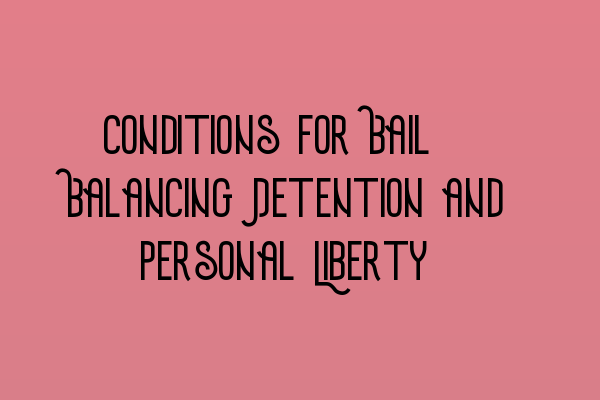Conditions for Bail: Balancing Detention and Personal Liberty
When individuals are accused of criminal offenses, one of the key considerations is whether they should be granted bail or held in custody. Bail is a fundamental aspect of the criminal justice system that aims to strike a delicate balance between the interests of the accused and the need to ensure public safety.
Before delving into the conditions for bail, it is important to understand its significance. Bail essentially allows a person to be released from custody while awaiting trial. This enables the individual to continue their normal life, attend their job, and tend to personal matters. However, bail comes with certain conditions that must be adhered to in order to ensure compliance with the law and protect public safety.
The Purpose of Bail Conditions
Bail conditions serve several purposes. Firstly, they help ensure that the accused will appear in court for their trial. By imposing restrictions on their movement, such as travel bans or curfews, the risk of fleeing is minimized. Secondly, bail conditions are designed to protect the safety and well-being of victims and witnesses. For example, a condition may be imposed to prevent the accused from contacting certain individuals involved in the case.
Additionally, specific requirements may be imposed to address concerns related to the nature of the offense. For instance, if the accused is facing drug-related charges, a condition of regular drug testing may be imposed. These conditions are tailored to the circumstances of each case, aiming to strike a balance between personal liberty and the interests of justice.
The Factors Considered in Granting Bail
When determining whether to grant bail and what conditions to impose, the court considers several factors, including:
- The seriousness of the offense: Courts are more likely to deny bail for individuals accused of serious crimes, such as murder or terrorism.
- The risk of flight: The court assesses whether the accused is likely to abscond and not appear for trial.
- The risk of reoffending: The likelihood that the accused will commit further offenses while on bail is taken into consideration.
- The strength of the evidence: The court evaluates the strength of the case against the accused and the likelihood of conviction.
Based on these factors, the court may grant bail with specific conditions attached or, in some cases, deny bail altogether and order pre-trial detention.
Common Bail Conditions
There are several common bail conditions that are often imposed to ensure compliance with the law and protect public safety. Some of these conditions include:
- Reporting to a police station: The accused may be required to regularly report to a designated police station.
- Surrendering travel documents: This condition prevents the accused from leaving the jurisdiction.
- Curfews: A curfew may be imposed to restrict the accused’s movement during specific hours.
- Prohibition of contact: The accused may be prohibited from contacting certain individuals involved in the case.
- Drug or alcohol testing: Regular testing may be required for individuals facing substance abuse-related charges.
These are just a few examples, and the specific conditions imposed will vary depending on the circumstances of each case.
If you are preparing for the SQE 1 or SQE 2 exams, we offer comprehensive preparation courses that can help you succeed. Check out our SQE 1 Practice Exam Questions and SQE 1 Practice Mocks FLK1 FLK2 to enhance your exam readiness. For more information on our preparation courses, visit SQE 2 Preparation Courses and SQE 1 Preparation Courses.
Stay informed about the latest SRA SQE exam dates by visiting our page. Our comprehensive resources and expert guidance can help you excel in the SQE exams and pursue a successful career in criminal law.
Remember, the conditions for bail are a crucial aspect of the criminal justice process. They aim to balance personal liberty with the need to protect public safety and ensure the fairness of the legal system.
